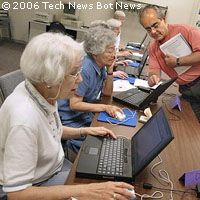Commission proposes new research initiative on ICT and ageing
The European Commission has adopted an action plan on 'Ageing well in the information society', and has proposed a new research initiative on the same theme, to be supported under Article 169 of the Treaty. 'Europe's population is ageing: average life expectancy has increased from 55 in 1920 to over 80 today. With the retiring baby boom generation the number of people aged from 65 to 80 will rise by nearly 40% between 2010 and 2030. This demographic change poses significant challenges to Europe's society and economy. Information and communication technologies (ICT) can play an important role in dealing with these challenges,' the action plan opens. The plan is intended to improve quality of life for older people (and thus introduce cost-savings in health and social care), and also to create a strong industrial basis in Europe for ICT and ageing. The Commission proposes action in six specific areas: - understanding older users; - market visibility and transparency; - regulatory barriers; - technical barriers; - basic access barriers and lack of adequate solutions; - other barriers. Technical barriers stem from the failure of mainstream ICT products and services to address the needs of older people, particularly in relation to the multiple progressive impairments that are associated with age. In addition, technological solutions often require putting together and interconnecting a variety of services in tools in a way that is beyond the ability of most users. And as markets alone do not provide sufficient incentives to guarantee interoperability and modularity across different devices and services, costs are relatively high for users, economies of scale are missed, and the internal market for ICT and ageing cannot take off. During 2007 and 2008, the Commission will carry out further assessments of the various barriers hindering the uptake of technologies for independent living, and will also assess the implications and opportunities provided by radio frequency identification (RFID) technologies. The Commission will also publish a Recommendation to Member States on the privacy aspects of RFID, and will promote further investment in RFID research. But the Commission alone cannot promote the use of digital technologies in healthy and independent ageing. Member States, business stakeholders, user organisations, regional and local authorities are asked to promote basic access through broadband to ICT services for ageing, and to increase digital competencies among older people. The Commission will then facilitate the exchange of good practices and access to programmes, services, solutions and multi-stakeholder initiatives through a new Internet portal. Many projects on ICT for ageing have already received funding under the EU's research framework programmes, and funding will continue under the Seventh Framework Programme (FP7). In addition, the Commission is proposing the establishment of a new research initiative on 'Ageing well in the information society', aimed at coordinating Member State research programmes on ICT for ageing. The initiative would have Article 169 of the Treaty as its legal basis, which states: 'In implementing the multiannual framework programme the Community may make provision, in agreement with the Member States concerned, for participation in research and development programmes undertaken by several Member States, including participation in the structures created for the execution of those programmes.' The new research initiative would aim to stimulate market-oriented research on applications for independent living, and bridge the gap between longer term research performed under FP7 and large-scale innovation projects under the Competitiveness and Innovation Programme (CIP). 'Europe's ageing population is a challenge for our job market and its social and health systems. But it is also an economic and social opportunity,' said Viviane Reding, European Commissioner for Information Society and Media. 'ICT will provide new and more accessible products and services that meet the needs of older people.'



